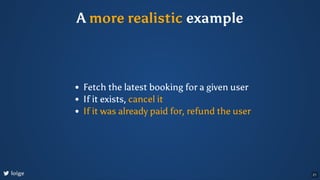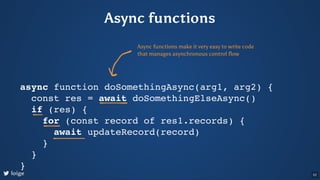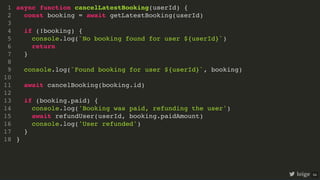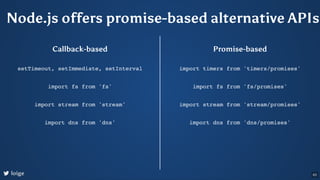The document discusses asynchronous programming in JavaScript, describing the differences between blocking and non-blocking I/O operations. It covers the use of callbacks, promises, and async/await to handle asynchronous tasks more effectively, addressing pitfalls like callback hell. Real-world examples illustrate the concepts of fetching, cancelling, and refunding bookings through various asynchronous approaches.
























































![Sequential execution
const users = ['Peach', 'Toad', 'Mario', 'Luigi']
for (const userId of users) {
await cancelLatestBooking(userId)
}
1
2
3
4
5
const users = ['Peach', 'Toad', 'Mario', 'Luigi']
1
2
for (const userId of users) {
3
await cancelLatestBooking(userId)
4
}
5
for (const userId of users) {
}
const users = ['Peach', 'Toad', 'Mario', 'Luigi']
1
2
3
await cancelLatestBooking(userId)
4
5
await cancelLatestBooking(userId)
const users = ['Peach', 'Toad', 'Mario', 'Luigi']
1
2
for (const userId of users) {
3
4
}
5
const users = ['Peach', 'Toad', 'Mario', 'Luigi']
for (const userId of users) {
await cancelLatestBooking(userId)
}
1
2
3
4
5
loige 57](https://image.slidesharecdn.com/from-nodejs-to-design-patterns-buildpiper-221204114353-ef7063b4/85/From-Node-js-to-Design-Patterns-BuildPiper-57-320.jpg)
![Sequential execution (gotcha!)
const users = ['Peach', 'Toad', 'Mario', 'Luigi']
users.forEach(async (userId) => {
await cancelLatestBooking(userId)
})
1
2
3
4
5
loige
⚠Don't do this with Array.map() or Array.forEach()
Array.forEach() will run the provided function without
awaiting for the returned promise, so all the invocation will
actually happen concurrently!
58](https://image.slidesharecdn.com/from-nodejs-to-design-patterns-buildpiper-221204114353-ef7063b4/85/From-Node-js-to-Design-Patterns-BuildPiper-58-320.jpg)
![Concurrent execution (Promise.all)
const users = ['Peach', 'Toad', 'Mario', 'Luigi']
await Promise.all(
users.map(
userId => cancelLatestBooking(userId)
)
)
1
2
3
4
5
6
7
loige
Promise.all() receives a list of promises and it returns a
new Promise. This promise will resolve once all the original
promises resolve, but it will reject as soon as ONE promise
rejects
59](https://image.slidesharecdn.com/from-nodejs-to-design-patterns-buildpiper-221204114353-ef7063b4/85/From-Node-js-to-Design-Patterns-BuildPiper-59-320.jpg)
![Concurrent execution (Promise.allSettled)
const users = ['Peach', 'Toad', 'Mario', 'Luigi']
const results = await Promise.allSettled(
users.map(
userId => cancelLatestBooking(userId)
)
)
1
2
3
4
5
6
7
loige
[
{ status: 'fulfilled', value: true },
{ status: 'fulfilled', value: true },
{ status: 'rejected', reason: Error },
{ status: 'fulfilled', value: true }
]
60](https://image.slidesharecdn.com/from-nodejs-to-design-patterns-buildpiper-221204114353-ef7063b4/85/From-Node-js-to-Design-Patterns-BuildPiper-60-320.jpg)



![util.promisify()
import { gzip } from 'zlib' // zlib.gzip(buffer[, options], callback)
import { promisify } from 'util'
const gzipPromise = promisify(gzip)
const compressed = await gzipPromise(Buffer.from('Hello from Node.js'))
console.log(compressed) // <Buffer 1f 8b 08 00 00 00 00 ... 00 00 00>
1
2
3
4
5
6
7
import { gzip } from 'zlib' // zlib.gzip(buffer[, options], callback)
1
import { promisify } from 'util'
2
3
const gzipPromise = promisify(gzip)
4
5
const compressed = await gzipPromise(Buffer.from('Hello from Node.js'))
6
console.log(compressed) // <Buffer 1f 8b 08 00 00 00 00 ... 00 00 00>
7
import { promisify } from 'util'
import { gzip } from 'zlib' // zlib.gzip(buffer[, options], callback)
1
2
3
const gzipPromise = promisify(gzip)
4
5
const compressed = await gzipPromise(Buffer.from('Hello from Node.js'))
6
console.log(compressed) // <Buffer 1f 8b 08 00 00 00 00 ... 00 00 00>
7
const gzipPromise = promisify(gzip)
import { gzip } from 'zlib' // zlib.gzip(buffer[, options], callback)
1
import { promisify } from 'util'
2
3
4
5
const compressed = await gzipPromise(Buffer.from('Hello from Node.js'))
6
console.log(compressed) // <Buffer 1f 8b 08 00 00 00 00 ... 00 00 00>
7
const compressed = await gzipPromise(Buffer.from('Hello from Node.js'))
console.log(compressed) // <Buffer 1f 8b 08 00 00 00 00 ... 00 00 00>
import { gzip } from 'zlib' // zlib.gzip(buffer[, options], callback)
1
import { promisify } from 'util'
2
3
const gzipPromise = promisify(gzip)
4
5
6
7
import { gzip } from 'zlib' // zlib.gzip(buffer[, options], callback)
import { promisify } from 'util'
const gzipPromise = promisify(gzip)
const compressed = await gzipPromise(Buffer.from('Hello from Node.js'))
console.log(compressed) // <Buffer 1f 8b 08 00 00 00 00 ... 00 00 00>
1
2
3
4
5
6
7
loige 64](https://image.slidesharecdn.com/from-nodejs-to-design-patterns-buildpiper-221204114353-ef7063b4/85/From-Node-js-to-Design-Patterns-BuildPiper-64-320.jpg)
![Promisify by hand 🖐
import { gzip } from 'zlib' // zlib.gzip(buffer[, options], callback)
function gzipPromise (buffer, options) {
return new Promise((resolve, reject) => {
gzip(buffer, options, (err, gzippedData) => {
if (err) {
return reject(err)
}
resolve(gzippedData)
})
})
}
const compressed = await gzipPromise(Buffer.from('Hello from Node.js'))
console.log(compressed) // <Buffer 1f 8b 08 00 00 00 00 ... 00 00 00>
1
2
3
4
5
6
7
8
9
10
11
12
13
14
15
16
function gzipPromise (buffer, options) {
}
import { gzip } from 'zlib' // zlib.gzip(buffer[, options], callback)
1
2
3
return new Promise((resolve, reject) => {
4
gzip(buffer, options, (err, gzippedData) => {
5
if (err) {
6
return reject(err)
7
}
8
9
resolve(gzippedData)
10
})
11
})
12
13
14
const compressed = await gzipPromise(Buffer.from('Hello from Node.js'))
15
console.log(compressed) // <Buffer 1f 8b 08 00 00 00 00 ... 00 00 00>
16
return new Promise((resolve, reject) => {
})
import { gzip } from 'zlib' // zlib.gzip(buffer[, options], callback)
1
2
function gzipPromise (buffer, options) {
3
4
gzip(buffer, options, (err, gzippedData) => {
5
if (err) {
6
return reject(err)
7
}
8
9
resolve(gzippedData)
10
})
11
12
}
13
14
const compressed = await gzipPromise(Buffer.from('Hello from Node.js'))
15
console.log(compressed) // <Buffer 1f 8b 08 00 00 00 00 ... 00 00 00>
16
gzip(buffer, options, (err, gzippedData) => {
})
import { gzip } from 'zlib' // zlib.gzip(buffer[, options], callback)
1
2
function gzipPromise (buffer, options) {
3
return new Promise((resolve, reject) => {
4
5
if (err) {
6
return reject(err)
7
}
8
9
resolve(gzippedData)
10
11
})
12
}
13
14
const compressed = await gzipPromise(Buffer.from('Hello from Node.js'))
15
console.log(compressed) // <Buffer 1f 8b 08 00 00 00 00 ... 00 00 00>
16
if (err) {
return reject(err)
}
import { gzip } from 'zlib' // zlib.gzip(buffer[, options], callback)
1
2
function gzipPromise (buffer, options) {
3
return new Promise((resolve, reject) => {
4
gzip(buffer, options, (err, gzippedData) => {
5
6
7
8
9
resolve(gzippedData)
10
})
11
})
12
}
13
14
const compressed = await gzipPromise(Buffer.from('Hello from Node.js'))
15
console.log(compressed) // <Buffer 1f 8b 08 00 00 00 00 ... 00 00 00>
16
resolve(gzippedData)
import { gzip } from 'zlib' // zlib.gzip(buffer[, options], callback)
1
2
function gzipPromise (buffer, options) {
3
return new Promise((resolve, reject) => {
4
gzip(buffer, options, (err, gzippedData) => {
5
if (err) {
6
return reject(err)
7
}
8
9
10
})
11
})
12
}
13
14
const compressed = await gzipPromise(Buffer.from('Hello from Node.js'))
15
console.log(compressed) // <Buffer 1f 8b 08 00 00 00 00 ... 00 00 00>
16
const compressed = await gzipPromise(Buffer.from('Hello from Node.js'))
console.log(compressed) // <Buffer 1f 8b 08 00 00 00 00 ... 00 00 00>
import { gzip } from 'zlib' // zlib.gzip(buffer[, options], callback)
1
2
function gzipPromise (buffer, options) {
3
return new Promise((resolve, reject) => {
4
gzip(buffer, options, (err, gzippedData) => {
5
if (err) {
6
return reject(err)
7
}
8
9
resolve(gzippedData)
10
})
11
})
12
}
13
14
15
16
import { gzip } from 'zlib' // zlib.gzip(buffer[, options], callback)
function gzipPromise (buffer, options) {
return new Promise((resolve, reject) => {
gzip(buffer, options, (err, gzippedData) => {
if (err) {
return reject(err)
}
resolve(gzippedData)
})
})
}
const compressed = await gzipPromise(Buffer.from('Hello from Node.js'))
console.log(compressed) // <Buffer 1f 8b 08 00 00 00 00 ... 00 00 00>
1
2
3
4
5
6
7
8
9
10
11
12
13
14
15
16
loige 65](https://image.slidesharecdn.com/from-nodejs-to-design-patterns-buildpiper-221204114353-ef7063b4/85/From-Node-js-to-Design-Patterns-BuildPiper-65-320.jpg)









![The web server
import { createServer } from 'http'
const urlRegex = /^/api/hotels/([w-]+)$/
createServer(async (req, res) => {
const url = new URL(req.url, 'http://localhost')
const matches = urlRegex.exec(url.pathname)
if (!matches) {
res.writeHead(404, 'Not found')
return res.end()
}
const [_, city] = matches
const hotels = await getHotelsForCity(city)
res.writeHead(200)
res.end(JSON.stringify({ hotels }))
}).listen(8000)
1
2
3
4
5
6
7
8
9
10
11
12
13
14
15
16
17
18
19
import { createServer } from 'http'
1
2
const urlRegex = /^/api/hotels/([w-]+)$/
3
4
createServer(async (req, res) => {
5
const url = new URL(req.url, 'http://localhost')
6
const matches = urlRegex.exec(url.pathname)
7
8
if (!matches) {
9
res.writeHead(404, 'Not found')
10
return res.end()
11
}
12
13
const [_, city] = matches
14
const hotels = await getHotelsForCity(city)
15
16
res.writeHead(200)
17
res.end(JSON.stringify({ hotels }))
18
}).listen(8000)
19
const urlRegex = /^/api/hotels/([w-]+)$/
import { createServer } from 'http'
1
2
3
4
createServer(async (req, res) => {
5
const url = new URL(req.url, 'http://localhost')
6
const matches = urlRegex.exec(url.pathname)
7
8
if (!matches) {
9
res.writeHead(404, 'Not found')
10
return res.end()
11
}
12
13
const [_, city] = matches
14
const hotels = await getHotelsForCity(city)
15
16
res.writeHead(200)
17
res.end(JSON.stringify({ hotels }))
18
}).listen(8000)
19
createServer(async (req, res) => {
}).listen(8000)
import { createServer } from 'http'
1
2
const urlRegex = /^/api/hotels/([w-]+)$/
3
4
5
const url = new URL(req.url, 'http://localhost')
6
const matches = urlRegex.exec(url.pathname)
7
8
if (!matches) {
9
res.writeHead(404, 'Not found')
10
return res.end()
11
}
12
13
const [_, city] = matches
14
const hotels = await getHotelsForCity(city)
15
16
res.writeHead(200)
17
res.end(JSON.stringify({ hotels }))
18
19
const url = new URL(req.url, 'http://localhost')
const matches = urlRegex.exec(url.pathname)
import { createServer } from 'http'
1
2
const urlRegex = /^/api/hotels/([w-]+)$/
3
4
createServer(async (req, res) => {
5
6
7
8
if (!matches) {
9
res.writeHead(404, 'Not found')
10
return res.end()
11
}
12
13
const [_, city] = matches
14
const hotels = await getHotelsForCity(city)
15
16
res.writeHead(200)
17
res.end(JSON.stringify({ hotels }))
18
}).listen(8000)
19
if (!matches) {
res.writeHead(404, 'Not found')
return res.end()
}
import { createServer } from 'http'
1
2
const urlRegex = /^/api/hotels/([w-]+)$/
3
4
createServer(async (req, res) => {
5
const url = new URL(req.url, 'http://localhost')
6
const matches = urlRegex.exec(url.pathname)
7
8
9
10
11
12
13
const [_, city] = matches
14
const hotels = await getHotelsForCity(city)
15
16
res.writeHead(200)
17
res.end(JSON.stringify({ hotels }))
18
}).listen(8000)
19
const [_, city] = matches
import { createServer } from 'http'
1
2
const urlRegex = /^/api/hotels/([w-]+)$/
3
4
createServer(async (req, res) => {
5
const url = new URL(req.url, 'http://localhost')
6
const matches = urlRegex.exec(url.pathname)
7
8
if (!matches) {
9
res.writeHead(404, 'Not found')
10
return res.end()
11
}
12
13
14
const hotels = await getHotelsForCity(city)
15
16
res.writeHead(200)
17
res.end(JSON.stringify({ hotels }))
18
}).listen(8000)
19
const hotels = await getHotelsForCity(city)
import { createServer } from 'http'
1
2
const urlRegex = /^/api/hotels/([w-]+)$/
3
4
createServer(async (req, res) => {
5
const url = new URL(req.url, 'http://localhost')
6
const matches = urlRegex.exec(url.pathname)
7
8
if (!matches) {
9
res.writeHead(404, 'Not found')
10
return res.end()
11
}
12
13
const [_, city] = matches
14
15
16
res.writeHead(200)
17
res.end(JSON.stringify({ hotels }))
18
}).listen(8000)
19
res.writeHead(200)
res.end(JSON.stringify({ hotels }))
import { createServer } from 'http'
1
2
const urlRegex = /^/api/hotels/([w-]+)$/
3
4
createServer(async (req, res) => {
5
const url = new URL(req.url, 'http://localhost')
6
const matches = urlRegex.exec(url.pathname)
7
8
if (!matches) {
9
res.writeHead(404, 'Not found')
10
return res.end()
11
}
12
13
const [_, city] = matches
14
const hotels = await getHotelsForCity(city)
15
16
17
18
}).listen(8000)
19
import { createServer } from 'http'
const urlRegex = /^/api/hotels/([w-]+)$/
createServer(async (req, res) => {
const url = new URL(req.url, 'http://localhost')
const matches = urlRegex.exec(url.pathname)
if (!matches) {
res.writeHead(404, 'Not found')
return res.end()
}
const [_, city] = matches
const hotels = await getHotelsForCity(city)
res.writeHead(200)
res.end(JSON.stringify({ hotels }))
}).listen(8000)
1
2
3
4
5
6
7
8
9
10
11
12
13
14
15
16
17
18
19
loige 75](https://image.slidesharecdn.com/from-nodejs-to-design-patterns-buildpiper-221204114353-ef7063b4/85/From-Node-js-to-Design-Patterns-BuildPiper-75-320.jpg)
![The data fetching function (with batching)
let pendingRequests = new Map()
function getHotelsForCity (cityId) {
if (pendingRequests.has(cityId)) {
return pendingRequests.get(cityId)
}
const asyncOperation = db.query({
text: 'SELECT * FROM hotels WHERE cityid = $1',
values: [cityId],
})
pendingRequests.set(cityId, asyncOperation)
asyncOperation.finally(() => {
pendingRequests.delete(cityId)
})
return asyncOperation
}
1
2
3
4
5
6
7
8
9
10
11
12
13
14
15
16
17
18
19
20 loige 76](https://image.slidesharecdn.com/from-nodejs-to-design-patterns-buildpiper-221204114353-ef7063b4/85/From-Node-js-to-Design-Patterns-BuildPiper-76-320.jpg)


